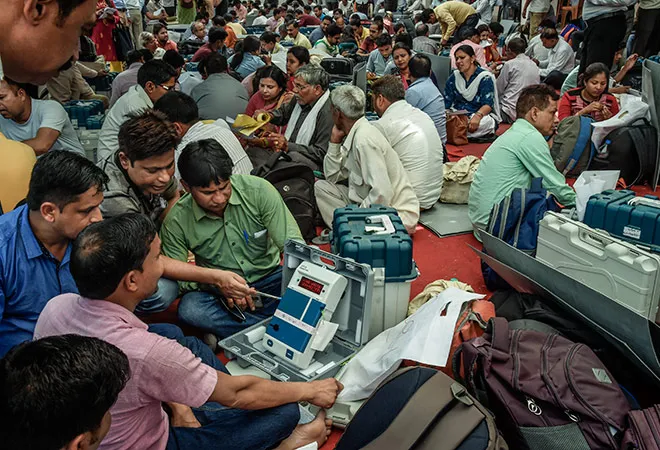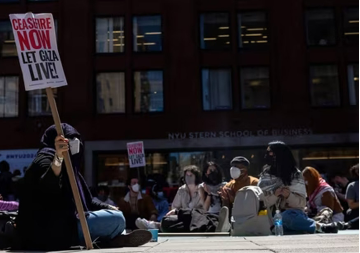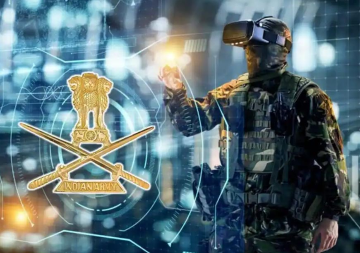
The credibility of the Election Commission of India (ECI) was under serious doubts as it conducted the seven-phased, over two month long parliamentary elections that came under severe questioning by the opposition parties as well as the civil society.
The statement issued by Former President Pranab Mukherjee on May 21 was of immense significance and a warning of sorts. “People’s mandate is sacrosanct and has to be above any iota of reasonable doubt.” Mukherjee had said as allegations of EVMs or vote tampering- began to appear in news websites and portals.
Stressing that the “onus of ensuring institutional integrity” lies with the EC, he went on to add that the “safety and security of EVMs which are in the custody of the EC is the responsibility of the Commission”. “There can be no room for speculations that challenge the very basis of our democracy”, he stressed.
It remains to be seen how the EC takes to the advice of the former Head of State. The situation reached this sorry state because of the highly partisan decisions taken by the EC as the elections were conducted across seven phases. The impression that captured public imagination was that Prime Minister Narendra Modi and the ruling party chief Amit Shah could do no wrong as the EC had given them clean chits despite multiple complaints regarding violations of model of conduct (MCC) levelled against them by the opposition parties and leaders.
It remains to be seen how the EC takes to the advice of the former Head of State. The situation reached this sorry state because of the highly partisan decisions taken by the EC as the elections were conducted across seven phases.
Giving clean chits to two top leaders of the ruling party by the EC came under severe public scrutiny when one of the members of the three-membered Commission, Ashok Lavasa openly objected to the decision, giving credence to allegations that there was no level-playing field. Differences between Lavasa and the other two commissioners grew to an extent where the former freed himself from the decision- making process.
The doubts over the EC’s mandated non-partisan role had begun with the very announcement of the general elections and the schedule that it drew for the mammoth electoral exercise. Schedule for the seven-phased electoral exercise suited the ruling party. In states like West Bengal and Odisha, where the BJP was hoping to make gains, multi-phased elections were announced; while in states like Andhra Pradesh, Tamil Nadu and Telangana voting took place in a single day. In UP where the BJP was facing a tough challenge, elections were held in all seven phases to help the Prime Minister and other top BJP leaders to campaign throughout the entire electoral process.
The doubts over the EC’s mandated non-partisan role had begun with the very announcement of the general elections and the schedule that it drew for the mammoth electoral exercise.
A piece titled ‘Election Commission under public scrutiny?’ published immediately after the announcement of the election schedule on the ORF website, had apprehended the approaching crisis of credibility of the EC because impression about its partisan role had been gaining ground for some months.
The EC, instead of making serious efforts to dispel such impressions, clung on to its stubborn frame of mind and refused to be perceptible to public criticism, particularly criticism that came from some quarters of the opposition.
One of the biggest issues of contention was that of the Voter Verified Paper Audit Trail (VVPAT) machines. The question of tallying VVPAT slips cropped up after the opposition parties contended after the 2017 assembly elections in UP , that the voting machines had been tampered with to favour the BJP.
Suspecting a repeat of the UP elections, opposition parties knocked at the doors of the Supreme Court asking it to direct the EC to count all the VVPAT machines. But the apex court directed the EC to count five VVPAT machines in each assembly segment, in place of one machine. In the Supreme Court, the EC had opposed any further increase in the counting of VVPAT machines on the grounds that it would delay the announcement of the electoral results; however the apex court observed that it would provide greater satisfaction to political parties and voters.
In the Supreme Court, the EC had opposed any further increase in the counting of VVPAT machines on the grounds that it would delay the announcement of the electoral results; however the apex court observed that it would provide greater satisfaction to political parties and voters.
EC’s contention that it would have delayed the electoral results does not hold any ground simply because maintaining people’s faith in democracy is far more important than a minor delay in the results. If people’s faith in electoral process is shaken or eroded then it will have dangerous consequences for the democratic system and polity. It is the fundamental responsibility of the EC to ensure that the popular faith in institutions drawing their mandate from the Constitution is maintained.
If people’s faith in electoral process is shaken or eroded then it will have dangerous consequences for the democratic system and polity. It is the fundamental responsibility of the EC to ensure that the popular faith in institutions drawing their mandate from the Constitution is maintained.
Opposition parties approached the EC again two days prior to the counting of votes with a request to count five random VVPAT machines in each assembly segments before the rest of EVMs are taken up for counting. The EC denied this request and stated that EVMs would be counted first and randomly picked five VVPAT machines would be counted later.
This dismissive approach towards representatives of different opposition parties results in potential distrust and negates the basic democratic tenet of public service that officials are constitutionally mandated to follow.
Irrespective of the final tallies of each political party that would determine whether they are going to be part of the ruling coalition or sitting in the opposition, the incoming NDA Two government would have to take urgent steps to restore the credibility of the EC and ensure that democratic foundations are strengthened further.
The views expressed above belong to the author(s). ORF research and analyses now available on Telegram! Click here to access our curated content — blogs, longforms and interviews.




 PREV
PREV


